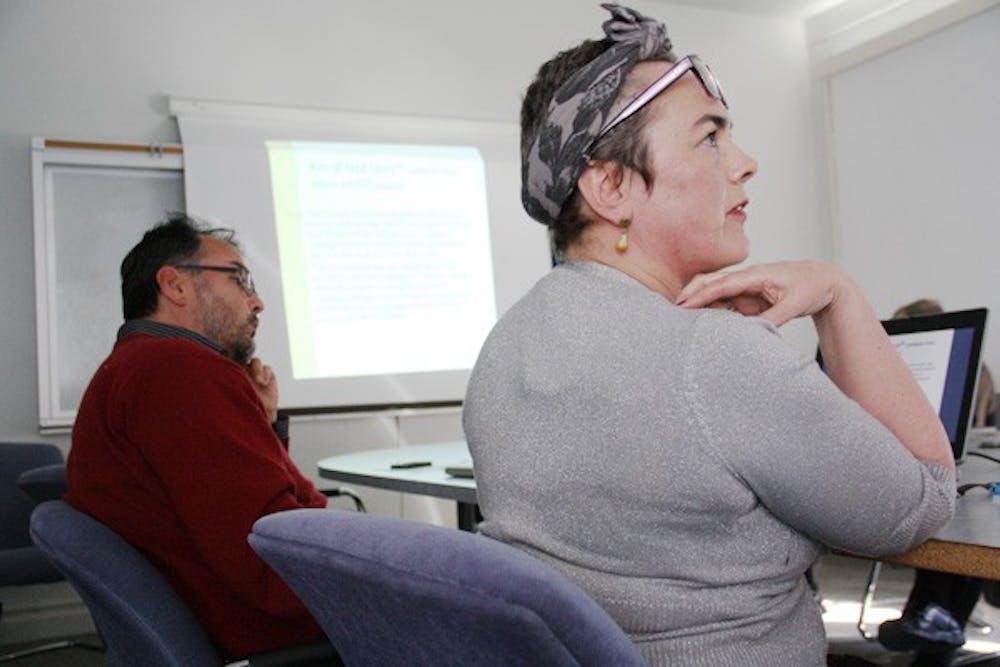 Rick Flowers and Elaine Swan, faculty of arts and social sciences at the University of Technology Sydney, lectured in West Hall on the Tempe campus Tuesday about Taste Food Tours and ‘culinary ethnicism,’ the presentation and story of diverse foods. (Photo by Shawn Raymundo)
Rick Flowers and Elaine Swan, faculty of arts and social sciences at the University of Technology Sydney, lectured in West Hall on the Tempe campus Tuesday about Taste Food Tours and ‘culinary ethnicism,’ the presentation and story of diverse foods. (Photo by Shawn Raymundo)Two professors from the University of Technology Sydney brought their research on food and its relation to race as part of ASU’s Project Humanities at the Tempe campus Tuesday.
Rick Flowers and Elaine Swan, authors of the pending book, “Food Pedagogies,” focused part of their research in ethnic food tours at one of the most ethnically diverse communities in Australia: Bankstown.
“In essence … it’s imagined that you can get to know another culture by eating their food,” Swan said.
People in Australia believe they are anti-racist because the food they eat is ethnic, she said.
“What we need to think about is what kind of multicultural encounter this is,” she said.
Flowers and Swan coined the term “culinary ethnicism” to describe the ways in which ethnicity and race present themselves in the ingredients, meals and food in the context of tourism.
“What happens in restaurants and cafes?” he said. “How is ethnicity formed by the waiters (and) by the costumers?”
The term was chosen to signify a change in the way food and ethnicity are perceived, Swan said.
“Culinary because we’re looking at food,” she said. “Ethnicism … to say we need to say we need to think about ethnicity with our critical heads on.”
Education graduate student Dinny Aletheiani said she was very interested in the way pedagogy relates to ethnicity.
“Food is the common language,” she said. “We associate people with the food. … In that sense, it relates to race.”
Swan and Flowers participated in several taste tours around Bankstown organized by the nonprofit Benevolent Society.
The tours consist of groups of 10 to 20 people that visit shops and restaurants to taste different ethnic food.
“The taste tours are a small project within a larger community,” he said. “(They are) half-day walking tours.”
The tour guides are women who hold degrees, Swan said.
It’s important to understand race, culture and ethnicity are all components in food, she said.
“These words have particular historical trajectories,” she said. “The politics of these terms matter.”
The tours serve as a social enterprise to generate money for the community and as a way to create jobs for the women, Flowers said.
Most people that participate in the tours come from Sydney with a preconceived notion of Bankstown, Swan said.
“They arrive in Bankstown wondering what they’re coming to and what is going to happen to them on the train,” she said. “Then they meet the tour guides, who make them feel comfortable … telling cultural stories along the way.”
The tours have become successful and get a lot of publicity across Australia.
They hold some control over the way Bankstown is perceived in Sydney, Swan said.
“The hosts are the guests,” she said. “It might be temporary … but they are able for a moment to host Bankstown.”
One of the ways in which food relates to race is by the way smell is perceived, she said.
“Traditionally, racism seems to have a lot to do with looking,” she said. “We want to start looking at smell. What is the rationalized history of smell?”
Some races believe their food has no smell and others do, Swan said.
“Food is about race-making,” she said. “We’re saying it to get away from that notion of it being about culture.”
Swan and Flowers said they brought their findings to ASU because they were interested to get involved in Project Humanities.
“It’s amazing what people can contribute,” Swan said. “It’s really good to go into different ethnic contexts.”
Some of the literature they used to complement their research comes from cultural theorist Stuart Hall and anthropologist Jane Desmond.
Gender studies graduate student Alicia Woodbury said it was interesting to see them using such literature, because it was so different than texts used at ASU.
“Everything is contextual. … There’s a limit of how much you can extrapolate,” she said. “There’s still a way to have what they’re doing inform our conversation locally.”
Woodbury’s research focuses on food and the way it relates to gender.
“There are a lot of people doing (research on) food on campus, but it’s usually the School of Sustainability,” she said. “That’s why this lecture seemed so interesting.”
Reach the reporter at dpbaltaz@asu.edu or follow her on Twitter @dpalomabp




